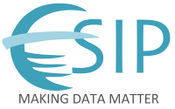ESA 2018 Data Help Desk: Difference between revisions
Jump to navigation
Jump to search
| Line 107: | Line 107: | ||
|- | |- | ||
| 3:30 || Kathryn Meyer || Creating a metadata record with Metacat || Brief overview on how to write a good metadata record, funder requirements and community best practices. | | 3:30 || Kathryn Meyer || Creating a metadata record with Metacat || Brief overview on how to write a good metadata record, funder requirements and community best practices. | ||
|- | |||
| 4:30 || Matt Davis || Getting started with PHYLACINE: The Phylogenetic Atlas of Mammal Macroecology || We will help users download this new database and get started with analysis. [https://megapast2future.github.io/ Find the data here!] | |||
|} | |} | ||
Latest revision as of 14:30, 8 August 2018
| Quick Links for ESA Help Desk Ecological Society of America | |
|---|---|
|
| |
| Date: August 6-10, 2018 New Orleans, LA | |
| Agenda | |
| Resources | |
About the Data Help Desk
Ecological data repositories and data specialists will collaborate at the ESA 2018 meeting in New Orleans to add a Data Help Desk to the Poster/Exhibition Hall. The Environmental Data Initiative (EDI), iDigBio, Earth Science Information Partners (ESIP), DataCite, DataONE, and Arctic Data Center will offer three types of assistance:
1) Data Reference Desk - For general information management and data discovery and use questions.
2) Meet the Expert - One-on-one sessions. Stop by the Help Desk and make an appointment!
3) Presentations/Software demos - About ecological data topics ranging from data repositories to analytical tools to creating metadata.
Schedule of Presentations/Software Demos
Monday
| Time | Speaker | Title | Abstract |
|---|---|---|---|
| 11:30 | Nancy Hoebelheinrich | Finding Convenient and Curated Research Data Management (RDM) Training... When You Need It! | This session will illustrate how the ESIP-hosted Data Management Training Clearinghouse can help members of the research team locate pertinent educational resources on RDM topics when they are needed. Specific filters will be highlighted that can help speed up the process of finding targeted online educational resources. |
| 12:00 | LUNCH | ||
| 1:30 | Amber Budden | Creating Effective Data Management Plans for Ecological Research | Introduction to the critical components of effective data management plans, with consideration of the ways in which your plan can be tailored to the size, duration, and breadth of your project. We will introduce to the DMPTool, a tool that provides multiple funder templates that can be adapted to meet individual needs. |
| 2:30 | Margaret O'Brien | Harmonizing ecological community datasets for synthesis | A content or design pattern helps you organize data of a particular type so it is easier to work with, and integrate with other data. EDI has a design pattern for community survey data which we will describe and demonstrate. |
| 3:30 | Karl Benedict | Introduction to Jupyter Notebooks | Have you wished for the ability to add live blocks of executable code and dynamic graphics in your word processor? Have you every wanted to write some nicely formatted text in the middle of your analysis code? Do you need to quickly present results from a new analysis to colleagues? Then, Jupyter Notebooks may be for you. This workshop will provide an introduction to notebook concepts and use. |
Tuesday
| Time | Speaker | Title | Abstract |
|---|---|---|---|
| 11:00 | Simona Picardi | Handling and managing animal tracking data in R | Animal tracking data are increasingly used in studies of movement ecology, habitat selection, and population ecology. I will present an overview of available tools for handling and analyzing tracking data in R, and provide a demo workflow from data import to some example analyses. |
| 12:00 | LUNCH | ||
| 1:30 | Matthew Aiello-Lammens | Building better species distribution models with the Wallace R package | The availability of publicly accessible biodiversity data is increasing rapidly as museums and herbaria digitize their holdings, and as citizen science projects mature and expand. These data provide large datasets of species occurrences, which can be analyzed using species distribution modeling approaches. The Wallace R package provides a means to access large datasets and guidance to appropriately build these models using state-of-the-art methods. |
| 2:30 | Patricia Cruse | Where Should I Put My Data: the Repository Finder Tool | Researchers in earth and space sciences often need help identifying an appropriate data repository to deposit their data.The Repository Finder tool helps researchers in the Earth, Space, and Environmental Sciences find an appropriate repository to deposit their research data, using information about more than 2,000 data repositories from re3data. The service is developed as part of the Enabling FAIR Data Project. |
| 3:30 | Karl Benedict | Introduction to distributed version control with Git and Github | Have you ever wished you could go back in time? Needed to share a snapshot of your work with someone while continuing to make changes? If your answer is yes to these questions you might want to consider adding version control to your life. This workshop will provide an introduction to the Git version control system and GitHub as a platform for sharing your version-controlled work (even with just yourself). |
Wednesday
| Time | Speaker | Title | Abstract |
|---|---|---|---|
| 11:00 | Will Pearse | How to use and contribute to the MADecology trait and community datasets | Make A Database of ecology (MADecology) is an R package that makes it easy to download and use community ecological and functional trait datasets. I will describe how to install and use the package, as well as how to contribute your own data to it. |
| 12:00 | LUNCH | ||
| 1:30 | Wade Bishop | Data Curation Profiles—An Information Science framework for data managers | This presentation explains Data Curation Profiles (DCP) and provides examples of how to use for digital biocollections. Ten biocollection producers, curating various types of specimens affiliated with the project building the United States’ national biodiversity infrastructure, were interviewed using the DCP questionnaire. Results indicate there is extreme diversity in the curation of biocollections and additional DCP questions should be added to reflect the complicated approaches to biological data curation. Although discipline specific metadata creation tools, standards, and practices enable long-term sustainability of the U.S. digitization effort, some scientists would benefit from further clarification and guidance on the information needs of consumers beyond designated communities of expert users, and the long-term preservation of biocollections. |
| 2:30 | Patricia Cruse | DataCite Services: Helping Researchers Find, Access, Integrate, and Use Research Data | DataCite is a leading global non-profit organization that provides persistent identifiers (DOIs) for research data. Our goal is to help the research community locate, identify, and cite research data with confidence. Learn about DataCite's aervices to meet the diverse needs of the global research community. We also bring this community together to address the challenges of making research data visible and accessible. DataCite provides connects a global network of researchers to support to making research data a first-class citizen. |
| 3:30 | TBA | TBA | TBA |
Thursday
| Time | Speaker | Title | Abstract |
|---|---|---|---|
| 11:00 | Amber Budden | Data Management Education and SkillBuilding Hub | This session will cover the basic principles of data management and introduce the Data Management Skillbuilding Hub, a centralized resource for educational webinars, modules and best practices materials |
| 12:00 | LUNCH | ||
| 1:30 | Shawn Taylor | Getting a handle on your data with the dplyr R Package | The dplyr package in R has become extremely popular. It replaces many base R functions for subsetting, summarizing, and creating new variables. I'll give introductions to basic dplyr commands which can help organize your data prior to analysis. |
| 2:30 | Corinna Gries | EDI's R workflow to generate EML metadata | We will demonstrate how to use the EMLAssemblyline R workflow in combination with the rEML package to generate valid metadata formatted in the Ecological Metadata Language XML standard. The workflow runs in RStudio and only limited R knowledge is needed to produce valid EML metadata that may be submitted to the Environmental Data Initiative's (EDI) repository for publishing. |
| 3:30 | Kathryn Meyer | Creating a metadata record with Metacat | Brief overview on how to write a good metadata record, funder requirements and community best practices. |
| 4:30 | Matt Davis | Getting started with PHYLACINE: The Phylogenetic Atlas of Mammal Macroecology | We will help users download this new database and get started with analysis. Find the data here! |
Resources
- Arctic Data Center




